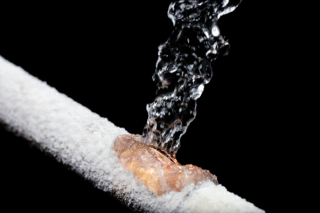Burst Pipes – Be Prepared for the winter blues

At this time of year temperatures can drop to very low levels during winter causing the pipes in your home and business to freeze which can lead to them bursting.
This situation can cause a major disruption to your home and business premises and can be avoided by following some simple advice.
During cold weather, the pipes in your home or business can freeze for a variety of reasons. Here are the most common causes of frozen pipes:
• Poorly protected pipes, which haven’t been insulated sufficiently.
• Exposure to icy draughts, usually as a result of cracks or gaps at the point where the pipe enters your property.
• Pipes located inside cupboards. Warm air from inside your home may not reach these pipes if your cupboard doors are closed.
Pipes don’t usually burst at the spot where an ice blockage occurs. Here are the common causes on why pipes can burst during cold weather.
1. Water freezes and expands inside your the pipes.
2. Continual freezing and expansion of water inside the pipe causes pressure to build up between the ice blockage and the closed faucet.
3. As a result of repeated pressure on this section of pipe, the pipe eventually bursts.
To ensure that water flows freely through your pipes this winter, here are some winter care tips to help you avoid a burst.
• Get insulated:
Insulate your loft area and the sides of your water tanks. To prevent your pipes bursting, wrap them in lagging (a foam material that insulates and reinforces them). You’ll be able to buy this from most DIY stores.
• Keep out the cold:
Most modern boilers have a frost protection thermostat which turns on automatically if the temperature drops to a level that will cause your pipes to freeze. Check that this is working properly. As added protection, it’s a good idea to open your loft trap door and any sink cupboards on cold days, to let in heat.
In very cold weather, you’ll need to leave your heating on a low setting (or set it to come on a couple of times a day), especially if you’re going on holiday for longer than a day or two.
• Find your stopcock:
Make sure you know where your stopcock is. Check regularly that you can turn it off easily in an emergency. You may find it helpful to label the stopcock, so you can easily locate it if you’re in a panic.
• Check pipes regularly:
If you’re going away for a while, ask a friend or relative to check your home or business regularly to make sure that your pipes haven’t burst or frozen.
• Maintenance:
Make sure to re-washer any dripping taps; if they freeze, they’ll block your pipes.
Dealing with frozen or burst pipes can be a nightmare – for some more tips and avoidance measures contact your local plumber and arrange for a check of your pipe work, this is relatively inexpensive and can save you a lot of time and money in the long run.
Author: Stuart Hurst CertCII, Senior Client Executive
« Back to all news

